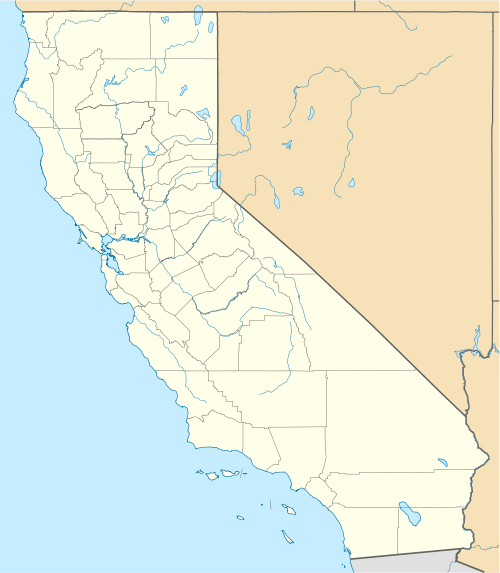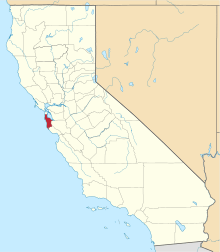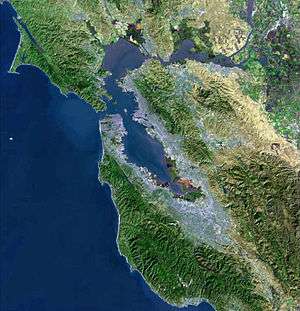San Gregorio, California
| San Gregorio, California | |
|---|---|
| Unincorporated community | |
 San Gregorio, California | |
| Coordinates: 37°19′38″N 122°23′12″W / 37.32722°N 122.38667°WCoordinates: 37°19′38″N 122°23′12″W / 37.32722°N 122.38667°W | |
| Country | United States |
| State | California |
| County | San Mateo |
| Area | |
| • Total | 16.7 sq mi (43.3 km2) |
| • Land | 16.7 sq mi (43.3 km2) |
| • Water | 0 sq mi (0 km2) |
| Elevation | 66 ft (20 m) |
| Population (2010)[1] | |
| • Total | 214 |
| 2010 United States Census | |
| Time zone | PST (UTC-8) |
| • Summer (DST) | PDT (UTC-7) |
| ZIP code | 94074 |
| Area code(s) | 650 |
| FIPS code | 06-67084 |
| GNIS feature ID | 1659577 |
| [2] | |
San Gregorio is an unincorporated community in San Mateo County, California, with a population of 214 people. It is located in the San Francisco Bay Area, south of Half Moon Bay. Just east of Highway 1, it is one mile (1.6 km) inland on Highway 84, from San Gregorio State Beach.
Climate

San Gregorio has a cool summer Mediterranean climate (Köppen climate classification Csb).
A National Weather Service cooperative weather station has been in operation in San Gregorio since June 1, 1954.[3] San Gregorio enjoys mild weather throughout the year, except for some remarkably chilly mornings, even in the summer. Fog and low overcast are common in the night and morning hours, too, especially in the summer. The fog usually clears to the shoreline by the afternoon. Temperatures are often much warmer just a few miles inland than on the coast. Most of the rainfall falls from November through April.
Normal annual precipitation is 29.52 inches (74.98 cm). San Gregorio has an average of 92.3 days with measurable rain. The wettest year on record was 1983 when 57.86 inches (146.96 cm) of rain fell. The wettest month recorded was 12.13 inches (30.81 cm) in February 1998. The maximum 24-hour rainfall was 6.87 inches (17.44 cm) on December 23, 1955. Although snow is very rare in the coastal lowlands, 4.0 inches (10 cm) fell in San Gregorio on January 21, 1962.
January is the coolest month with an average high of 60.1 °F (15.6 °C) and an average low of 40.3 °F (4.6 °C). September is the warmest month with an average high of 72.5 °F (22.5 °C) and an average low of 49.3 °F (9.6 °C). The highest temperature on record was 99 °F (37 °C) on October 5, 1987. The lowest temperature on record was 20 °F (-6.6 °C) on December 20, 1998. Temperatures exceed 90 °F (32 °C) on an average of only 1.8 days, but have occurred in April, May, June, July, August, September, and October. Freezing temperatures (32 °F / 0 °C) or below are more common, occurring on an average of 13.1 days, and have been recorded in January, February, March, April, May, June, October, November, and December.
| Climate data for San Gregorio, California | |||||||||||||
|---|---|---|---|---|---|---|---|---|---|---|---|---|---|
| Month | Jan | Feb | Mar | Apr | May | Jun | Jul | Aug | Sep | Oct | Nov | Dec | Year |
| Average high °F | 60.1 | 60.3 | 60.2 | 62.1 | 63.8 | 67.1 | 69.9 | 71.1 | 72.5 | 70.5 | 64.8 | 60.7 | 65.2 |
| Average low °F | 40.3 | 41.6 | 42.2 | 42.6 | 46.0 | 48.2 | 50.6 | 51.1 | 49.3 | 45.4 | 41.7 | 39.1 | 44.8 |
| Average precipitation inches | 5.71 | 5.37 | 4.60 | 2.00 | .85 | .29 | .13 | .20 | .41 | 1.67 | 3.93 | 4.36 | 29.52 |
| Average high °C | 15.6 | 15.7 | 15.6 | 16.7 | 17.7 | 19.5 | 21.1 | 21.7 | 22.5 | 21.4 | 18.2 | 15.9 | 18.4 |
| Average low °C | 4.6 | 5.3 | 5.7 | 5.9 | 7.8 | 9.0 | 10.3 | 10.6 | 9.6 | 7.4 | 5.4 | 3.9 | 7.1 |
| Average precipitation mm | 145 | 136 | 117 | 50.8 | 21.6 | 7.4 | 3.3 | 5.1 | 10.4 | 42.4 | 99.8 | 110.7 | 749.8 |
| Source: "Climatography of the United States," National Climatic Data Center (www.ncdc.noaa.gov) | |||||||||||||
History
The first European land exploration of Alta California, the Spanish Portolà expedition, passed through the area on its way north, camping for three days near today's San Gregorio, October 24–26, 1769. Franciscan missionary Juan Crespi noted in his diary, "This is a fine place, with good lands and an abundance of water, where a good mission could be placed".[4] No mission was ever established here, however. The string of Spanish Missions established over the next 50 years followed a more inland route through San Jose. During the Mexican era, the area was part of Rancho San Gregoria.[5][6]

Named after Pope Gregory I (Saint Gregory the Great).[7] San Gregorio was a booming town in the 1850s, when wealthy San Franciscans would travel to the San Gregorio House by stagecoach to enjoy fishing, hunting, sea bathing, and boat races.[8][9] The building still stands, but is no longer a functioning hotel.[9] In the nineteenth century, a Chinese community had lived along the creek which runs through San Gregoria, however the buildings of the former community were washed away due to heavy rains.[6] The San Gregorio General Store has been operating since 1889.[10] The original stagecoach stop stands across Highway 84 from the store.[11] In 1915, the community was home to seven cheese factories.[12] San Gregorio has been the site of several film locations and television show episode scenes.[13]
References
- ↑ "Profile of General Population and Housing Characteristics: 2010". 2010 Demographic Profile Data. United States Census Bureau. 2010. Retrieved 5 January 2015.
- ↑ "Feature Detail Report for: San Gregorio". Geographic Names Information System. United States Geological Survey. 19 January 1981. Retrieved 5 January 2015.
- ↑ "SAN GREGORIO 2 SE, CALIFORNIA (047807)". Western Regional Climate Center. Desert Research Institute. 30 November 2007. Retrieved 5 January 2015.
- ↑ Bolton, Herbert E. (1927). Fray Juan Crespi: Missionary Explorer on the Pacific Coast, 1769-1774. HathiTrust Digital Library. pp. 220–222. Retrieved April 2014. Check date values in:
|access-date=(help)
Buz Bezore; Christina Waters (3 May 2005). Explorer's Guide Big Sur, Monterey Bay & Gold Coast Wine Country: A Great Destination. Countryman Press. p. 27. ISBN 978-1-58157-074-8. - ↑ Bob Dougherty (2007). La Honda. Arcadia Publishing. p. 19. ISBN 978-0-7385-4738-1.
Mildred Brooke Hoover (1948). Historic Spots in California. Stanford University Press. p. 396. ISBN 978-0-8047-7817-6. - 1 2 Historic Spots in California, Third Edition (1966) [First published 1932]. Historic Spots in California, Third Edition. Stanford University Press. pp. 395–396. ISBN 978-0-8047-4020-3.
- ↑ Erwin Gustav Gudde (1960). California Place Names: The Origin and Etymology of Current Geographical Names. University of California Press. pp. C–286. GGKEY:403N5Z6QERG.
Erwin Gustav Gudde (1 June 1969). 1000 California Place Names: Their Origin and Meaning. University of California Press. p. 73. ISBN 978-0-520-01432-9.
William Bright (31 October 1998). 1500 California Place Names: Their Origin and Meaning, A Revised version of 1000 California Place Names by Erwin G. Gudde, Third edition. University of California Press. p. 132. ISBN 978-0-520-92054-5. - ↑ California Coastal Commission (1 January 1987). California Coastal Resource Guide. University of California Press. p. 179. ISBN 978-0-520-06186-6.
Susan Dinkelspiel Cerny; Beth A. Armstrong (January 2007). An Architectural Guidebook to San Francisco and the Bay Area. Gibbs Smith. p. 72. ISBN 978-1-58685-432-4. - 1 2 Dorothy F. Regnery (1 January 1976). An Enduring Heritage: Historic Buildings of the San Francisco Peninsula. Stanford University Press. pp. 32–33. ISBN 978-0-8047-0918-7.
- ↑ Heather C. Liston; Elizabeth Linhart Veneman (26 February 2013). Moon Northern California. Avalon Travel Publishing. p. 176. ISBN 978-1-61238-149-7.
Bonnie Wach (January–February 2003). "San Gregorio's General Store". Via. AAA Northern California, Nevada & Utah. Retrieved 5 January 2015. - ↑ Ray Hosler (1 February 2002). Bay Area Bike Rides. Chronicle Books. p. 142. ISBN 978-0-8118-3421-6.
- ↑ California; California. Legislature (1915). Appendix to the Journals of the Senate and Assembly ... of the Legislature of the State of California ... Sup't State Printing. p. 6.
- ↑ Stacy Trevenon (1 August 2007). "Filming takes place under big top in San Gregorio". Half Moon Bay Review. Retrieved 5 January 2015.
"Most Popular Titles With Filming Locations Matching "San Gregorio California"". IMDB. Amazon.com. Retrieved 5 January 2015.
External links
- California State Waters Map Series—Offshore of San Gregorio, California United States Geological Survey

